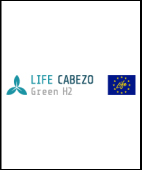
LIFE Project: MW-scale green hydrogen production plant to decarbonize meat waste treatment in Spain
- Type Project
- Status Filled
- Execution 2021 -2023
- Assigned Budget 6.174.645,00 €
- Scope Europeo
- Autonomous community Madrid, Comunidad de
- Main source of financing LIFE
- Project website Web del proyecto
Project focused on reducing CO2 emissions by replacing natural gas used as fuel in meat waste treatment with renewable H2 in meat waste treatment.
- Installation in Muel (Zaragoza) of a H2 production plant based on water electrolysis technology, directly connected to the Cabezo wind farm, with a capacity of 23.3 MW.
- Production of more than 100 tons of green H2 per year, which would be used in the decarbonization of local industry.
- Use of oxygen produced as a byproduct of the electrolysis process by local metallurgical companies.
Currently, one-third of global energy-related emissions come from economic sectors for which there are currently no economical alternatives to fossil fuels. These emissions originate primarily from energy-intensive industrial sectors and freight transport. The industrial sector is one of the largest energy consumers and accounts for a quarter of Europe's energy consumption. Meat waste processing is a major source of greenhouse gas emissions.
RESIDUOS ARAGON emits approximately 11,500 tons of CO2eq per year. The process is very energy-intensive, requiring significant amounts of steam. However, by incorporating 5% hydrogen (H2) into the natural gas consumption, emissions can be reduced by up to 170 tons of CO2eq/year at this stage of the industrial process, while maintaining its competitiveness. CO2 emissions can be further reduced by up to 20% by replacing or modernizing equipment.
The project complies with the EU's 2030 climate and energy framework and the European Green Deal, as it reduces greenhouse gas emissions and promotes the use of renewable energy in industry. The project also complies with the 2021-2030 National Integrated Energy and Climate Plan (NECP) by contributing to the reduction of greenhouse gas emissions.
Reduce CO2 emissions by replacing natural gas used as fuel in meat waste treatment with renewable H2, deploying sector-specific coupling applications.
The expected results were not achieved
- Coordinator/entity name: Mónica Sanchez Delgado
Postal address: Paseo de los Olmos, 19, 28005, Madrid,
- ENAGA?S, S.A.,ENAGáS RENOVABLE SL
- LOONIT(LOONIT SRL)
- Falck (Renantis S.p.A)
- H2GREEM(H2GREEM GLOBAL SOLUTIONS S.L)
- RS(RESIDUOS ARAGON SL)







